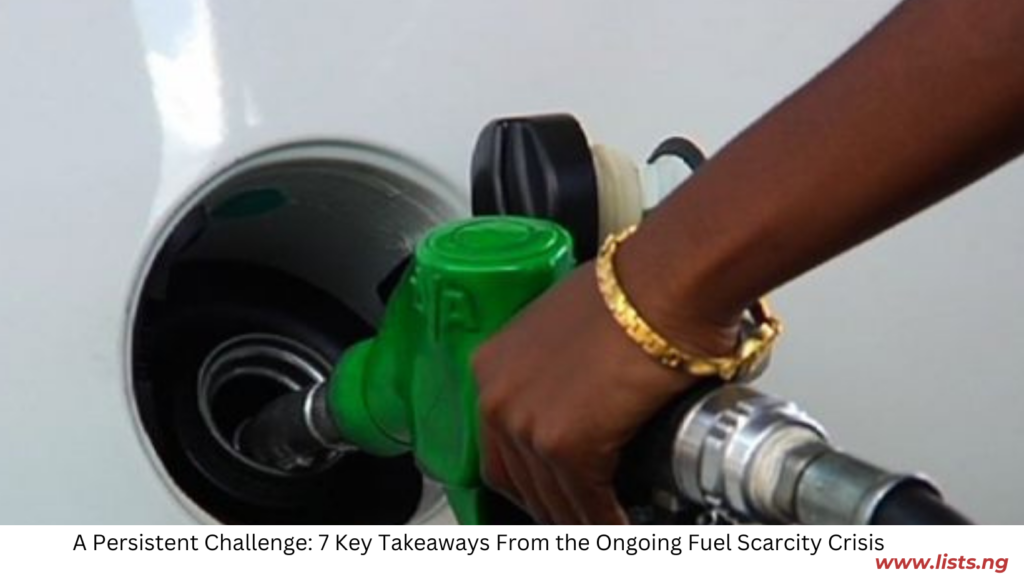Fuel scarcity in Nigeria is a recurring issue that continues to affect the daily lives of millions. Despite being one of the largest oil producers in Africa, Nigeria often faces fuel shortages that disrupt transportation, businesses, and the economy at large. This problem reflects deeper systemic issues within Nigeria’s oil sector, including mismanagement, corruption, and infrastructural deficits.
The transportation sector is particularly hard-hit during periods of scarcity. Public transportation fares often double or triple, making it difficult for the average Nigerian to commute. The scarcity also drives up the cost of food and other essentials, further straining the finances of citizens.
Recently, the Nigerian National Petroleum Corporation (NNPC) released a statement addressing the current fuel scarcity. The corporation assured Nigerians that it was taking steps to ensure the availability of petroleum products nationwide. According to the NNPC, the scarcity was a result of distribution challenges, not a shortage of products. The press release highlighted several measures the NNPC was taking to resolve the situation, including the mobilization of additional trucks to various depots and the reopening of key pipelines to enhance product distribution.
Here are the seven key takeaways:
- Distribution Challenges, Not Shortages, Are the Main Problem
The NNPC clarified that the current fuel scarcity is not due to a shortage of petroleum products. Instead, it’s primarily caused by distribution challenges. Issues such as transportation bottlenecks, logistical delays, and inefficiencies in the supply chain have made it difficult to get fuel to where it’s needed most. This distinction is crucial because it shifts the focus from concerns about supply levels to the need for better infrastructure and logistics.
- Increased Mobilization of Trucks
To combat these distribution challenges, the NNPC announced that it is increasing the number of trucks deployed to depots across the country. This move is intended to expedite the delivery of fuel, particularly to areas hardest hit by the scarcity. By boosting the fleet of trucks, the NNPC aims to reduce the time consumers spend in long queues at petrol stations, ensuring a more reliable and timely supply of fuel.
- The Subsidy Debate Continues
The issue of fuel subsidies remains a hot topic. While the government argues that removing subsidies will allow market forces to stabilize fuel prices and ensure availability, many Nigerians fear this will lead to higher costs and further hardship.
- Calls for Refinery Rehabilitation
A recurring theme in discussions about fuel scarcity is the need for Nigeria to rehabilitate its refineries. By upgrading and fully utilizing local refining capacity, the country can reduce its dependency on imported fuel and avoid future shortages.
- Panic Buying and Hoarding Worsen the Situation
The NNPC highlighted that panic buying and hoarding by some marketers are exacerbating the scarcity. When consumers and marketers hoard fuel in anticipation of further shortages, it creates an artificial scarcity, worsening the problem. The NNPC has urged the public to avoid stockpiling fuel, reassuring them that there is enough supply to meet the country’s needs. This appeal is a reminder that public behavior can significantly impact the severity of fuel shortages.
- Pipeline Reopening for Enhanced Distribution
In addition to increasing the number of trucks, the NNPC is working on reopening key pipelines that have been closed due to maintenance or security concerns. These pipelines are critical for the efficient distribution of fuel, as they allow for the transport of large volumes of petroleum products across the country. Reopening these pipelines is expected to alleviate some of the pressure on the distribution network, improving the overall availability of fuel.
- Public Reaction and Criticism
The NNPC’s press release received mixed reactions from the public. While some Nigerians appreciated the corporation’s efforts to address the situation, others expressed skepticism, citing past experiences where similar assurances were made but the scarcity persisted. Critics argue that the NNPC’s explanation fails to address the root causes of the problem, such as the dependency on fuel imports and the inefficiency of the local refining sector.
Conclusion,
Fuel scarcity is a complex issue that requires a multifaceted solution. While the NNPC’s recent press release offers some hope, it is clear that more needs to be done to address the root causes of the problem. Only through a combination of infrastructural improvements, policy reforms, and public engagement can Nigeria hope to end the cycle of fuel scarcity and ensure a stable supply of petroleum products for its citizens.



